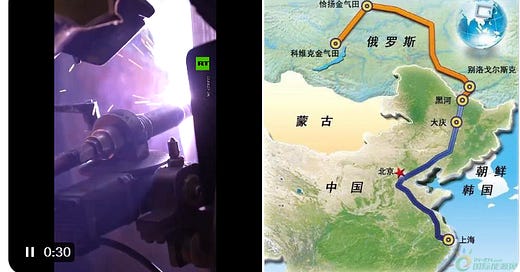Capital Flows Where Treated Best: The New Pipeline of Gold, Silver, and Gas
Europe grapples with energy shortages, it is ironically ceding its energy needs to an increasingly emboldened China, which welcomes the influx of Russian gas with open arms. Gas, Gold, Silver Giddyup
The recent announcement of a 30-year gas supply contract between Russia and China marks a significant geopolitical shift that underscores the folly of NATO's sanctions against Moscow. As Europe grapples with energy shortages, it is ironically ceding its energy needs to an increasingly emboldened China, which welcomes the influx of Russian gas with open arms.
This new pipeline deal, which will transport 38 billion cubic meters of gas annually, is not just a lifeline for Russia but a strategic victory for China. While European nations have sought to isolate Russia through sanctions, they remain heavily reliant on its oil and gas. As a result, they find themselves in a precarious position, forced to navigate a complex web of energy diplomacy while their adversary strengthens ties with one of the world's largest economies.
NATO's strategy to punish Russia has backfired spectacularly. The sanctions aimed at crippling the Russian economy have instead accelerated its pivot towards Asia, particularly China. The Kremlin's newfound partnership with Beijing allows it to redirect its energy exports away from Europe, effectively undermining the West's attempts to isolate it. This not only secures a lucrative market for Russian gas but also enhances China's energy security, further intertwining their fates.
Moreover, this deal highlights the shortsightedness of European energy policy. As countries like Germany scramble to find alternative sources of energy, they are inadvertently facilitating the rise of a Sino-Russian axis that could reshape global energy dynamics. The irony is palpable: while Europe seeks to punish Russia, it inadvertently fuels its economic resilience by allowing it to forge stronger ties with China.
In conclusion, NATO's sanctions may have been intended as a deterrent against Russian aggression, but they have instead paved the way for a powerful alliance that threatens to alter the balance of power in the region. Europe must reassess its energy strategy before it finds itself further sidelined in this new geopolitical landscape.
The Russia-China gas pipeline deal serves as a powerful metaphor for how these nations are leveraging precious metals and energy to circumvent the US dollar's dominance.
Just as natural gas flows through this pipeline, bypassing traditional routes, gold and silver are becoming conduits for capital between these economic powerhouses





Interestingly, this dynamic is also likely to make gas more expensive in the future for US consumers. Today the cost of gas in the US is about 20% of what it costs in the EU. Export restrictions, denial of export permits, unfinished export terminals, and over production have led to a domestic supply glut.
However, the EU wants and needs US gas. Once the restrictions are lifted and the permits granted and construction brings 4 new export terminals online over the next 24 months, the supply glut will disappear. The EU will see prices drop, US producers will see profits rise, and US consumers will see higher prices.